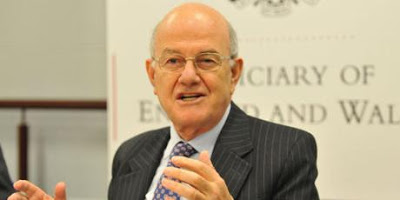Cameras in court: an appealing prospect?
TV cameras will be allowed into the Court of Appeal for the first time from October 2013 and senior judges will be offered training before appearing on camera, the Lord Chief Justice, Lord Judge told the Lords Constitution Committee on 30 January. The select committee takes evidence from the Lord Chief Justice (pictured above) each year… Continue reading
TV cameras will be allowed into the Court of Appeal for the first time from October 2013 and senior judges will be offered training before appearing on camera, the Lord Chief Justice, Lord Judge told the Lords Constitution Committee on 30 January.
 The select committee takes evidence from the Lord Chief Justice (pictured above) each year and questions him on the state of the law, the judiciary and legal services. This year’s session (Lord Judge’s last, before retiring later this year) was reported in some detail by Owen Boycott, Legal affairs correspondent of The Guardian Law page.
The select committee takes evidence from the Lord Chief Justice (pictured above) each year and questions him on the state of the law, the judiciary and legal services. This year’s session (Lord Judge’s last, before retiring later this year) was reported in some detail by Owen Boycott, Legal affairs correspondent of The Guardian Law page.
The discussion ranged over topics such as cuts to legal aid, the proposed reduction in the use of QCs in legally aided criminal defence work (Rumpole of the Bailey might well have approved of that, actually) and diversity among judges. But the most sensational bit was about the possibility that our diligent law reporters, who cover the Court of Appeal as well as other senior and appellate courts, may now be seen at work on a TV screen near you.
The Guardian report included the following on this matter:
Lord Judge cautioned against government plans to extend filming into crown courts, where criminal trials take place before juries, for fear it will provoke disruptions and deter witnesses from giving evidence.
Judge, 71, who is due to step down in September after five years in office, told peers: “I’m perfectly happy with cameras coming into court, provided their presence doesn’t increase the risk that justice won’t be done. [But] I’m very troubled about having cameras just swanning around the court.
“I think you have got to see how it works in the Court of Appeal. I am bound to say that in most cases I suspect John and Jane citizen will find it incredibly dull.
He added: “I hope I am not being cynical, but I can envisage a time coming – not in any situation that I can contemplate today nor with any political party currently in office – but I can see a political advantage being seen, ‘Well, the television companies have been awfully difficult at the moment for the last few months, it might do quite well for us to let them do it.'”
He told the committee: “We will arrange for those judges who sit in these courts to have some training in the fact of the television cameras going to be present and the general idea is that it will start in October in the two courts of appeal.”
Ministers have said they intend to extend filming into crown courts to show judges’ sentencing remarks “in due course”. Judge said it should only be done with the agreement of the Lord Chief Justice. His counterpart in New Zealand had warned him about incidents where there had been demonstrations from people in court during sentencing, including “cheers and boos”.
Filming would start in October in the criminal and civil divisions of the Appeal Court, he said. Extending filming to jury trials might deter witnesses from coming forward. The Supreme Court in Westminster is the only court that currently has its proceedings routinely televised.
Justice minister Helen Grant said later: “We believe televising court proceedings will help improve transparency and bring greater public confidence and understanding of the criminal justice system. We want to modernise the system and make the courts accessible to the public, whilst ensuring correct procedures are in place to safeguard all participants.”